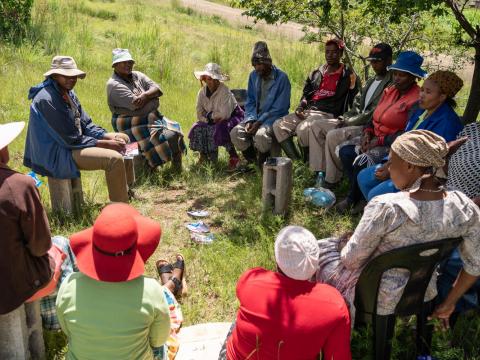
The (participation) revolution will not be televised
Catherine reflects on the loss of the much-anticipated participation revolution promised at the World Humanitarian Summit.
By Catherine Green
Just as Gil Scott Heron sang in 1971 that the revolution will not be televised, the participation revolution promised in the Grand Bargain will not be televised either because, well, it never really happened.
As we approach the five-year anniversary of the World Humanitarian Summit, Overseas Development Insitute, the global affairs think tank, has published an article anticipating the Humanitarian Policy Group’s independent review of the Grand Bargain which concludes what many suspected when the Grand Bargain commitments were made in 2016; we have not managed to achieve a participation revolution. While some workstreams (like increasing the use and coordination of cash) have made excellent progress, others lag seriously behind.
Absolutely what we see in general across the sector is that the participation revolution has not come to pass. But the thing is, we know how to achieve participation. Across World Vision, there are excellent examples of teams and offices not just seeking feedback but actually engaging communities in decision-making within a response.
Community participation is at the heart of our work. Promoting Participation is one of the pillars of our Programme Accountability Framework. During World Vision’s response to the earthquake in Nepal, the programme’s log frame was designed based on information gathered from a series of community consultations. We used community-led assessments to identify major sectoral activities so interventions were safe and culturally appropriate. But it’s not just World Vision doing this. There are plenty of examples of radical accountability and meaningful participation. For example, 30 agencies working in the arid and semi-arid lands of Kenya have come together to form the ASAL Humanitarian Network so they can draw on members’ expertise in local communities to ensure initiatives, like locust surveillance and COVID-19 perception tracking, are contextual and community-led. Elsewhere, response-wide perception monitoring is done by organisations like Ground Truth Solutions so agencies can gain insight into exactly what communities want and need.
Having participation entrenched in our guidelines and policies should ensure that meaningful participation is always achieved during humanitarian responses.
Yet, our global COVID-19 Response’s real-time learning exercise revealed that only half of World Vision respondents from field offices ‘believe that World Vision has ensured affected populations have been able to participate in decisions that affect them during the pandemic’. We know we have good practices; they just need to be systematically and intentionally applied. So why isn’t this happening everywhere?
Participation isn’t something we can achieve just with more funding (although that would help!), a new fancy app, or setting up an independent commission for voices in crises to sit at the apex of the existing humanitarian structure, as has been suggested by said structure’s recent Emergency Relief Coordinator, Mark Lowcock.
Don’t get me wrong, an independent review body isn’t a terrible idea in itself . . . but one that reinforces the current systemic inequities? That totally misses the point. On the other hand, a community-led independent review body would be something we should all get behind! Participation needs to be an intentional way of working that – due to the inherent power balances within the current system – requires accountability to the people being served rather than the people who sign the cheques.
Sometimes a systemic shift such as this requires bold leadership from organisations like World Vision to make it happen. While ODI’s article makes a lot of good recommendations, I have to disagree with their suggestion that what is missing is ‘stronger-buy-in at the senior leadership level’. While this buy-in is of course critical, I find more hope in the fact that good practices already exist and are scalable. We can all contribute to this effort by consistently providing diverse, free, safe, and accessible mechanisms and opportunities for communities to: 1) be involved in decision-making, 2) share their feedback, and 3) receive quick, relevant, and effective aid in response (even when what they say they want or need isn’t what was planned for originally!).
If we wait for the system to be ‘fixed’ to start this revolution, it’ll never happen. Let’s find our own ways to amplify people’s voices, support organising efforts, boost social protection systems, and help communities to understand and claim their rights by including participation and accountability into the way we work every day.
Catherine Green is a Humanitarian Accountability Advisor for World Vision International.